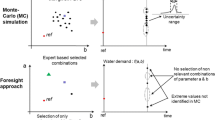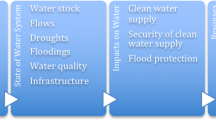Abstract
Predicted climate change may significantly affect drinking water supply in urban areas. Local water stakeholders facing climate change will have to deal with uncertain information and unexpected events. To address this lack of data, the knowledge and experience of practitioners might be used to assess the potential impacts of climate change on different issues, including drinking water supply. This paper proposes a participatory approach to identify local issues associated with drinking water supply (from source to tap) in a climate change context. This approach relies on the experience and knowledge of local practitioners. The proposed approach was applied to the Québec City metropolitan area (Province of Quebec, Canada). It is based on assignment examples (in this case, a selected set of districts from the study territory) in order to generalize application to the entire territory. This approach helps stakeholders to rationally consider different dimensions and the complexity of drinking water supply.



Similar content being viewed by others
Notes
In this study, hazard is defined as the probability (unquantified) that a particular danger occurs within a given period of time (ISSMGE 2004).
References
Bates BC, Kundzewics ZW, Wu S, Palutikof JP (eds) (2008) Climate change and water. technical paper of the intergovernmental panel on climate change. Intergovernmental Panel on Climate Change (IPCC), Geneva, Switzerland
Canadian Council of Professional Engineers (2008) Adapting to climate change: Canada’s first national engineering vulnerability assessment of public infrastructure. ON, Canada
Chakhar S, Saad I (2012) Dominance-based rough set approach for groups in multicriteria classification problems. Decis Support Syst 54:372–380. doi:10.1016/j.dss.2012.05.050
Cloutier G, Joerin F (2012) Tackling climate change adaptation at the local level through community participation. In: Holt WG (ed) Research in urban sociology, vol 12. Emerald Group Publishing Limited, Bingley, pp 51–73
Delpla I, Jung AV, Baures E, Clement M, Thomas O (2009) Impacts of climate change on surface water quality in relation to drinking water production. Environ Int 35:1225–1233. doi:10.1016/j.envint.2009.07.001
Dias L, Mousseau V, Figueira J, Climaco J (2002) An aggregation/disaggregation approach to obtain robust conclusions with ELECTRE TRI. Eur J Oper Res 138:332–348. doi:10.1016/S0377-2217(01)00250-8
Environnement Canada (2013) Normales et moyennes climatiques au Canada 1971–2000. Service météorologique du Canada. http://climate.weather.gc.ca/climate_normals/index_f.html. Accessed 11 December 2013
Lemmen DS, Warren FJ (eds) (2004) Climate change impacts and adaptation: a canadian perspective. Government of Canada, ON, Canada
Greco S, Matarazzo B, Slowinski R (2001) Rough sets theory for multicriteria decision analysis. Eur J Oper Res 129:1–47. doi:10.1016/S0377-2217(00)00167-3
Haase D (2013) Participatory modelling of vulnerability and adaptive capacity in flood risk management. Nat Hazards 67:77–97. doi:10.1007/s11069-010-9704-5
Hallegatte S (2009) Strategies to adapt to an uncertain climate change. Glob Environ Chang 19:240–247. doi:10.1016/j.gloenvcha.2008.12.003
Hengeveld H, Whitewood B, Fergusson A (2005) An introduction to climate change: a canadian perspective. ON, Canada
Hersh R, Wernstedt K (2002) Gauging the vulnerability of local water systems to extreme events. J Environ Plan Manag 45:341–361. doi:10.1080/09640560220133397
Hung H-C, Chen L-Y (2013) Incorporating stakeholders’ knowledge into assessing vulnerability to climatic hazards: application to the river basin management in Taiwan. Clim Chang 120:491–507. doi:10.1007/s10584-013-0819-z
ISSMGE (2004) Glossary of risk assessment terms – Version 1. Technical Committee on Risk Management (TC32) of the International Society of Soil Mechanics and Geotechnical Engineering (ISSMGE). http://140.112.12.21/issmge/2004Glossary_Draft1.pdf. Accessed 11 December 2014
Kreutzwiser R, Moraru L, de Loë R, Mills B, Schaefer K (2003) Drought sensitivity of municipal water supply systems in Ontario. Great Lakes Geogr 9:59–70
Mailhot A, Duchesne S (2005) Impacts et enjeux liés aux changements climatiques en matière de gestion des eaux en milieu urbain. Vertigo – La revue en sciences de l’environnement Hors-série 2:1–9. doi:10.4000/vertigo.1931
Mailhot A, Duchesne S, Caya D, Talbot G (2007) Assessment of future change in Intensity-Duration-Frequency (IDF) curves for southern Quebec using the Canadian Regional Climate Model (CRCM). J Hydrol 347:197–210. doi:10.1016/j.jhydrot.2007.09.019
Meuleman AFM, Cirkel G, Zwolsman GJJ (2007) When climate change is a fact! Adaptive strategies for drinking water production in a changing natural environment. Water Sci Technol 56:137–144. doi:10.2166/Wst.2007.545
Mittal N, Mishra A, Singh R (2013) Combining climatological and participatory approaches for assessing changes in extreme climatic indices at regional scale. Clim Chang 119:603–615. doi:10.1007/s10584-013-0760-1
Morgan DL (1997) Focus groups as qualitative research, 2nd edn. Sage, London
Mousseau V, Slowinski R (1998) Inferring an ELECTRE TRI model from assignment examples. J Glob Optim 12:157–174. doi:10.1023/A:1008210427517
Ouranos (2010) Savoir s’adapter aux changements climatiques. Montréal, QC, Canada
Pampalon R, Gamache P, Hamel D (2010) Indice de défavorisation matérielle et sociale du Québec: suivi méthodologique de 1991 à 2006. Publication de l’Institut Nationale de Santé du Publique du Québec, Canada
Picketts IM, Curry J, Dery SJ, Cohen SJ (2013) Learning with practitioners: climate change adaptation priorities in a Canadian community. Clim Chang 118:321–337. doi:10.1007/s10584-012-0653-8
US EPA (2011) Climate change vulnerability assessments: four case studies of water utility practices. Global Change Research Program, National Center for Environmental Assessment, United States Environmental Protection Agency (US EPA), Washington, DC, USA
Vachon G, Chouinard MN, Cloutier G, Dubois C, Després C (2013) Adapting cities to climate change: an action-research approach to imagining design solutions, measuring their feasibility and acceptability, and informing decision. Enquiry/ARCC J Archit Res 10:14–28
Yang C, Huang J-B (2000) A decision model for IS outsourcing. Int J Inf Manag 20:225–239. doi:10.1016/S0268-4012(00)00007-4
Acknowledgments
The authors wish to thank the Ouranos Consortium (http://www.ouranos.ca/en/) for supporting this study under the Climate Change and Urban Transformation Research-Action Project. The authors wish also to express their gratitude to Natural Resources Canada (http://www.nrcan.gc.ca/) and the Fonds Vert Québec (http://www.mddep.gouv.qc.ca/). The authors would also like to thank Martial Labarthe, Dominique Viens, Jean-Philippe Labbé-Tremblay, Catherine Dubois and Martin Laliberté, our colleagues and members of the Action-Research Project. Finally, authors are indebted to all the local actors who took part in the different meeting sessions for their unfailing and crucial feedback, and to the people who contributed to the data collection.
Author information
Authors and Affiliations
Corresponding author
Rights and permissions
About this article
Cite this article
Legay, C., Cloutier, G., Chakhar, S. et al. Estimation of urban water supply issues at the local scale: a participatory approach. Climatic Change 130, 491–503 (2015). https://doi.org/10.1007/s10584-015-1366-6
Received:
Accepted:
Published:
Issue Date:
DOI: https://doi.org/10.1007/s10584-015-1366-6




